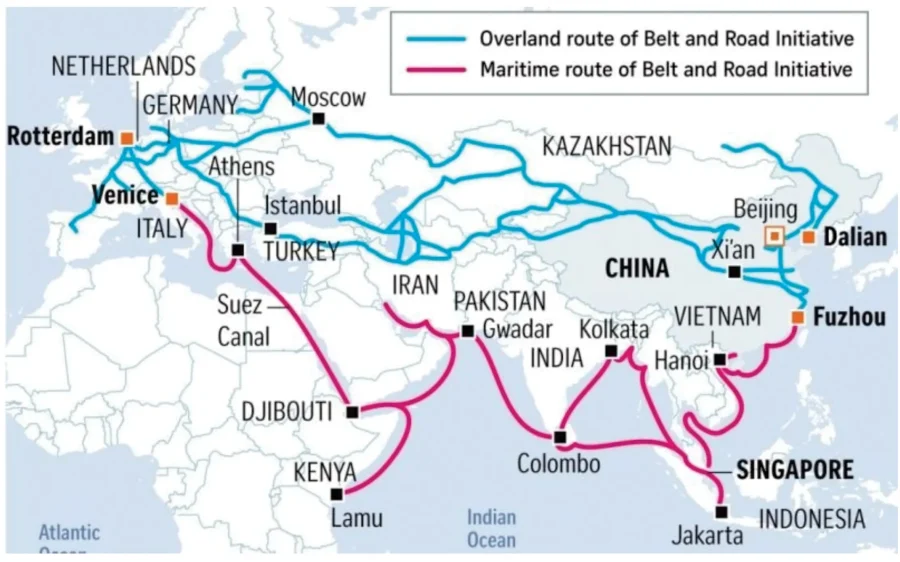The 3rd Belt and Road Initiative (BRI) forum for international cooperation is scheduled to take place on October 17-18 in Beijing. During this event, Chinese policymakers intend to unveil new priorities, plans, policies and projects aimed at advancing regional and global development through the BRI, often referred to as the “Project of the 21st Century.” Over 120 countries have confirmed their participation in this significant gathering.
In the last ten years, BRI has successfully introduced and institutionalized a new concept of development, cooperation and coordination which has never been “expansionary”, “exploitative”, “conquest” and “conspiratorial”. For these reasons, more than 153 countries, 200 documents and 32 international organizations have joined and signed the BRI which vividly reflects its “global importance” and “stimulating capacity” to speed up the world’s economy in the right direction. It is now “responsible” for a new era of transit routes, trade and growth for economies in Asia, Central Asia, ASEAN, Africa, EU and around the world.
According to the Chinese International Development Cooperation Agency (CIDCA) the BRI has so far completed over 3,000 projects in the last ten years. This expansive effort has garnered support from more than 180 countries and international organizations which is a good omen for the regional as well as international economy.
Hopefully, the next decade would also be full of economic, industrial, green energy transformation, human capital development, health, climate change and last but not the least, true reflection of multiculturalism in which Global South will achieve its desired goals of socio-economic prosperity and sustainable growth. Moreover, despite severe geopolitics of the US, EU and now India to contain China and collapse its economy have announced their own trans-regional projects namely Build Back Better World (BBBW), Global Gateway (GGW) and India-Middle East-Europe Economic Corridor (IMEC) but all of these projects have not yet “surfaced” and “materialized”. The most recent Israel-Hamas war would further produce strains on IMEC and BBBW.
It appears that propaganda targeting China, CPEC and BRI has gained momentum, even within Pakistan. This is not a positive development. Despite sponsored criticism, China has reiterated its willingness to support the high-quality development of the CPEC, which has brought tangible benefits to Pakistan’s economic development and its people.
During the third Trans-Himalaya Forum for International Cooperation held in Nyingchi, China’s Xizang (Tibet) Autonomous Region, while meeting with the Caretaker Foreign Minister of Pakistan, Jalil Abbas Jilani, the Chinese Foreign Minister, Wang Yi, asserted that the CPEC had brought tangible benefits to the economic development of Pakistan and its people. Mr. Jilani acknowledged that CPEC had helped Pakistan transform its economic landscape and brought tangible benefits to the country. He underscored the importance of regional cooperation for green development, ecological preservation and connectivity for inclusive and sustainable development.
Chinese Ambassador to Pakistan, Jiang Zaidong, has also reconfirmed the fruitfulness of the CPEC in the last decade cementing the solid foundation of ironclad friendship between the two countries. He shared that CPEC has brought a total of $25.4 billion in direct investment, 155,000 direct jobs, 510 kilometres of expressways, 8,200 megawatts of power capacity and 886 kilometres of core power transmission grid to Pakistan, injecting strong momentum into Pakistan’s economic and social development.
He was of the view that China’s spirit of extensive consultation, joint contribution and shared benefits would further promote policies of Global Development Initiative, Global Security Initiative and Global Civilizational Initiative with Pakistan, providing more stability and positive energy to regional and world peace and development.
According to reliable diplomatic sources, Pakistan and China are set to sign over two dozen pacts at the 3rd BRI Forum. The Chinese embassy has confirmed that the National Development and Reform Commission of China (NDRC) has proposed to sign Memorandums of Understanding (MoUs) with relevant Pakistani authorities during Caretaker Premier Anwaar-ul-Haq Kakar’s upcoming visit to China to attend the forum. The agreements will cover eight key areas: Urban Sustainable Development, major issues of Belt and Road Cooperation, Mineral Development and Industrial Cooperation, Research on Routes for Industrial Cooperation, Expert Exchange Mechanism, Expert Communication Mechanism on Gwadar Port Development, Green and Low-carbon Development, and Digital Economy Cooperation.
Meanwhile, Pakistan’s Mission in Beijing has shared a list of 19 MoUs which are expected to be signed/announced during the visit of Mr. Kakar. Moreover, Main Railway Line-1, Karachi Circular Railway (KCR), realignment of KKH (Thakot-Raikot) will also be discussed during the 3rd BRI forum. D I Khan- Zhob Road Project, Mirpur-Muzaffarabad-Mansehra road, Babusar tunnel and Karachi-Hyderabad Motorway (M-9) will also be discussed.
China has shared a draft MoU on development of renewable energy projects in Pakistan on September 26, 2023. Pakistan is reviewing the proposal.
The Pakistani side has completed all formalities pertaining to 1320-MW Thar Block-1(Shanghai) and 300-MW coal project Gwadar, hopefully both sides will make substantive progress.
In summary, it is predicted that the genie of geopolitics would further divide the world in the future. The regional as well as global economies would be on the mercy of obsessive power politics of the US and the West. The incidents of de-coupling and de-risking would be further accelerated creating serious hurdles in global value supply chains.
The ongoing Israel-Hamas conflict has regional as well as global socio-economic, geo-political and geostrategic ramifications which would further derail and delay the process of grand normalization in the Middle East which would lessen futuristic orientations of Saudi-Iran peace agreement. Connectivity, economic cooperation and political stability would be in the line of fire due to naked aggression of both sides which should be settled through peaceful negotiations.
Nevertheless, the future belongs to green energy(wind, solar), blue/green hydrogen power generation, EVs, lithium batteries, smart living, conservation of water resources, disaster management and joint efforts anti-looming threats of climate change in which CPEC and BRI would play important role in the days to come. BRI carries true spirits of geo-economics which would reduce ripples of the geopolitics in the world.









